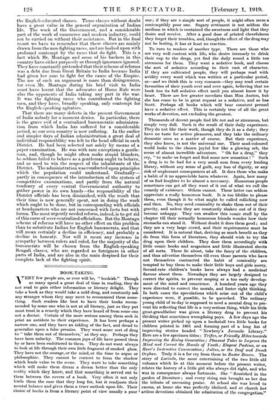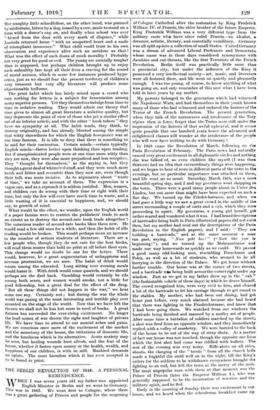BOOK-TAKING.
VERY few people are, or ever will be, " bookish." Though so many spend a great deal of time in reading, they do not read to gain either information or literary delight. They take a book as they would take a mild drug, and constantly ask any stranger whom they may meet to recommend them some- thing. Such readers like beat to have their books recom- mended by some one who is not at all literary, just as they put most trust in a remedy which they have heard of from some one not a doctor. Certain of the more serious among them seek in print an antidote to their experience. It has been perhaps a narrow one, and they have an inkling of the fact, and dread to generalize upon a false premise. They want some sort of drug to " take them out of themselves," as they say. Perhaps they have been unlucky. The common joys of life have passed them by or have been embittered to them. They do not want always to look at life through their own little fragment of smoked glass. They have not the courage, or the mind, or the time to argue or philosophize. They cannot be content to form the shadow which lends value to the scene. They want to take something which will make them dream a dream better than the only reality which they know, and that something is served out to them between the covers of a book. Very often it not only lends them the ease that they long for, but it readjusts their mental balance and gives them a truer outlook upon life. Their choice of books is from a literary point of view usually a poor one; if they are a simple sort of people, it might often seem a contemptibly poor one. Sugary sentiment is not seldom the medium in which is contained the sweetness and light that they desire and receive. After a good dose of printed cheerfulness they forgot their troubles, and, though the effect of the drug may not be lasting, it has at least no reaction.
To turn to readers of another type. There are those who are very well content with life, who desire intensely to drink their cup to the dregs, yet find the daily round a little too strenuous for them. They want a sedative book, and choose the sort of sedative according to their east of character. If they are cultivated people, they will perhaps read with avidity every word which was written at a particular period, or—and we think this is very common—they may read certain favourites of their youth over and over again, believing that no book has its full sedative effect until you almost know it by heart. There are few greater novelists than Miss Austen, but she has come to he in great request as a sedative, and eo has Scott. Perhaps all books which will bear constant perusal have a sedative effect. This is certainly true of all the great works of devotion, not excluding the greatest.
Thousands of decent people find life not sad or strenuous, but simply very dull. Such is the result of their daily experience. They do not like their work, though they do it as a duty; they have no taste for active pleasures, and they take the ordinary domestic ones as a matter of course. But their experience. they also know, is not the universal one. Their mud.coloured world looks to the chosen joyful few like a glowing orb, the scene of almost incredible adventure. "Oh for a drug," they cry, " to make us forget and find some new sensation ! " Such a drug is to be had for a very small sum from every lending library, without any sense of guilt, any loss of dignity, or any risk of unpleasant consequences at all. It does those who make a habit of it no appreciable harm whatever. Again, how many of us find laughter to be almost a necessary. Humorous people sometimes can get all they want of it out of what we call the comedy of existence. Others cannot. These latter CM seldom appreciate a really humorous book. It is too lifelike to please them, even though it be what might be called rollicking now and then. No, they need comicality to shake them out of their gravity, and unless they are constantly shaken out of it they become unhappy. They can swallow this comic stuff by the chapter till their normally humorous friends wonder how their stomachs can stand it. Without doubt it does them good ; and they are a very large crowd, and their requirements must be considered. It is natural that, deriving so much benefit as they do from this form of literature, they should wish to try the drug upon their children. They dose them accordingly with little comic books and magazines and little illustrated sheets of all sorts. These lie about, take the fancy of the children. and thus advertise themselves till even those parents who have not themselves contracted the habit of comicality are tempted to buy them to make their little boys and girls merry. Second-rate children's books have always had a medicinal flavour about them. Nowadays they are largely designed to correct the spirits, to prevent moping or a too early develop- ment of the mind and conscience. A hundred years ago they were directed to correct the morale, and foster right thinking. In both cases the speculations which arise out of the child's experience were, if possible, to be quenched. The ordinary young child of to-day is supposed to need a mental drug to pre- vent his reflecting that life is a very serious thing, while his little great-grandfather was given a literary drug to prevent his thinking that sometimes wrongdoing pays. A few days ago the present writer picked up upon a bookstall two little books for children printed in 1801 and forming part of a long list of improving stories headed " Newbery's Juvenile Library." Here are a few specimen titles : Trifles, or Friendly Mites towards Improving the Rising Generation; Pleasant Tales to Improve the Mind and Correct the Morals of youth; Elegant Pastime, or 470 Hour's Instructive Conversation; Julius, or the Deaf and Dumb Orphan. Truly it is a far cry from these to Buster Brown. The story of Lucinda, the more entertaining of the two little old volumes which lie at this moment before the present writer, relates the history of a little girl who always did right, and who was in consequence always fortunate. She " flourished in the garden of literature ; and every rising sun brought as her due the tribute of unceasing praise. At school she was loved to excess, at home she was perfectly idolized, and at church her artless devotions obtained the admiration of the congregation."
Her naughty little schoolfellow, on the other band, was pursued by misfortune, bitten by a dog, teased by a cow, made to stand on a fonn with a dunce's cap on, and finally when school was over hissed from the door with every mark of disgrace," while Lucinda returned home " with an unspotted heart and a smile of triumphant innocence." What child could trust to his own observation and experience after such an antidote as that 1 What was the effect of such doses of mock morality ? Probably not very great for good or eviL The young are mentally tougher than is supposed, but perhaps children brought up to enjoy such unhealthy fare kept all their lives a craving for the sound of moral axioms, which in some few instances produced hypo- crites, just as we should fear the present tendency of children's very• innocent but very silly literature will produce some objectionable buffoons.
The print habit which has lately seized upon a crowd who care nothing for letters is a subject for lamentation among many superior persons. Yet they themselves indulge from time to time in sedative reading. They would admit our theory that time gives to almost all great literature a sedative quality, but they deprecate the point of view of those who get a similar effect out of an inferior article, and with the other " book-takers " they have no sympathy at all. The habit tends, they think, to destroy originality, and has already blunted among the simple that witty shrewdness for which the English bourgeoisie was at one time famous. It is idle to deny that there is something to be said for their contention. Certain minds—certain typically English minds—thrive better upon thinking than upon reading. But if unsophisticated people were at one time more witty than they are now, they were also more prejudiced and less receptive. They "thought for themselves," as the saying is, but they thought a great deal of whimsical stuff, and they were much more harsh and bitter and eccentric than they now are, even though their talk was more incisive. As to arguments about " waste of time," we take no account of them. The expression is a vague one, and as a reproach it is selddm justified. Men, women, and children can do wrong with their time or right with their time, but only the few will ever have much time to waste, and a little wasting of it is essential to happiness, and, we should say, to growth of mind.
What would be the effect, we wonder, upon the English world if a paper famine were to restrict the publishers' trade to such an extent as to destroy the second-rate book trade altogether ? The voracious reader of second-rate books likes them new. He would read a few old ones for a while, and then the habit of idle reading would be broken. This would perhaps mean an increase in the number of serious students of literature. There are a few people who, though they do not care for the best books, will read them sooner than hold no print at all before their eyes. This change would no doubt be one for the better. There would, however, be a great augmentation of unhappiness and nervous prostration, we are sure. The habit of drink would return among the educated. Long sitting over evening meals would foster it. With drink would come quarrels, and we should perhaps see the duel back. Gambling would certainly be rife among both sexes, and women would smoke, not a little-for good fellowship, but a great deal for the effect of the drug. " But all these things did not happen in the war," we hear some one say. Certainly not ; but during the war the whole world was gazing at the most interesting and terrible play over mounted on the stage of the world. Now that we haVe left the theatre we shall not be less but more in need of books. A great flatness has succeeded the ever-rising excitement. No longer the loud noises of war drown the sighs and laughter of private life. We have time to attend to our mental aches and pains. We are conscious once more of the excitement of the market and the monotony of the house, the irritations of domestic life, and the loneliness which is its alternative. Acute anxiety may be over, but healing wounds hurt afresh, and the fear of the future, whether it fasten upon money or the health, wealth, and happiness of our children, is with us still. Mankind demands an opiate. The most harmless which it has ever accepted is to be found in print.



































 Previous page
Previous page